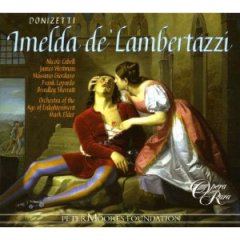Donizetti – Imelda de Lambertazzi (Elder) [2008]
Donizetti – Imelda de Lambertazzi (Elder) [2008]

Disc: 1 1. Act 1. Preludio. All'armi! 2. Act 1. Preludio. Amici! e qual risuona 3. Act 1. Preludio. Voi, che fulmini di guerra 4. Act 1. Preludio. Ah! si oda lo squillo 5. Act 1. Recitativo dopo l'Introduzione. Itale schiere 6. Act 1. Scena e Cavatina Imelda. Vincesti alfin! 7. Act 1. Scena e Cavatina Imelda. Amarti, e nel martoro 8. Act 1. Scena e Cavatina Imelda. Ma il Ciel non ode 9. Act 1. Recitativo dopo la Cavatina Imelda. E' il genitor nelle sue stanze, Imelda? 10. Act 1. Duetto. Ah! m'odi... 11. Act 1. Duetto. Non ti giurasti mia? 12. Act 1. Recitativo dopo il Duetto d'Imelda e Bonifacio. E' Orlando che si avanza! 13. Act 1. Finale Primo. Del cittadino al dritto 14. Act 1. Finale Primo. D'invitti Eroi degni nepoti! 15. Act 1. Finale Primo. Vengo a voi 16. Act 1. Finale Primo. L'incarco esponi 17. Act 1. Finale Primo. E quale pegno di stabil pace 18. Act 1. Finale Primo. Imelda! Disc: 2 1. Act 2. Recitativo e Duetto. Segui i miei passi 2. Act 2. Recitativo e Duetto. Di Bonifacio il padre... 3. Act 2. Recitativo e Duetto. Tu l'hai spenta nel mio petto 4. Act 2. Recitativo dopo il Duetto. Mi narri il ver? 5. Act 2. Scena. Chi viene? 6. Act 2. Scena. Dolente a voi ritorno 7. Act 2. Aria di Bonifacio. Imelda a me volgea 8. Appendix. M'odi almen 9. Act 2. Duetto, Finale Secondo. Imelda... Lasciarti? 10. Act 2. Duetto, Finale Secondo. Ma volano rapidi 11. Act 2. Duetto, Finale Secondo. Addio per sempre! 12. Act 2. Duetto, Finale Secondo. Ove ten fuggi? 13. Act 2. Duetto, Finale Secondo. Morte al Guelfo! 14. Act 2. Duetto, Finale Secondo. Padre... son rea... lo vedo! Nicole Cabell –Imelda (soprano); Massimo Giordano – Lamberto (tenor); Frank Lopardo – Orlando (tenor); James Westman – Bonifacio (baritone); Brindley Sherratt – Ubaldo (baritone) Orchestra of the Age of Enlightenment Geoffrey Mitchell Choir Mark Elder – conductor
Imelda de’Lambertazzi immediately precedes Anna Bolena in the long line of Donizetti operas, and the two works could not be more different. The latter was an immediate success and the work that effectively brought the composer into the limelight, constructed on the large-scale Rossinian model (Semiramide, for example), while the former is Donizetti at his most concise and singular. The most important male role is Bonifacio, written for the baritone Antonio Tamburini, one of the great singers of his time. The two tenors are father and son, the son being more important musically, and to whom devolves an almost-aria embedded in the introduction. Orlando, the father, is dramatically if not musically present, and at the premiere was sung by a young tenor, thereby straining audience credibility since the role of the son Lamberto was taken by a considerably older singer. Imelda herself is a soprano, without much in the way of fioritura, who dies at the end in an arioso (replaced by the more customary cabaletta in a revival where the singer had more clout than the creator of the role). The story is one of warring clans, with Imelda enamored of the young man from the other side. Both she and her paramour die, with father and son pleased that the vendetta has been continued. All of this transpires with great rapidity, as Verdi later emulated in several of his “mid-period” operas. A limited performance history (thank you, Tom Kaufmann) lists Naples, Barcelona, La Coruña in rapid succession, followed more than 20 years later by Senigallia and then nothing until a rough-and-ready concert performance in 1989 by the Swiss Italian radio forces (perhaps still available on Nuova Era, though my copy has bronzed), and now Opera Rara to the rescue.
Nicole Cabell in the title role may be something of a surprise, as Donizetti requires little use of her high notes or coloratura facility, but she acquits herself well. Imelda’s final, dying arioso is perhaps the most inspired moment of the score and Cabell is more than touching. James Westman (a name new to me) shows a healthy baritone as Bonifacio, though his coloratura-ridden lines do not always come easily. His two duets with Imelda plus an aria make him the second most important character in the work. Both Massimo Giordano and Frank Lopardo (son and father) make the most of the occasional opportunity that comes their way, their voices sufficiently contrasted. Mark Elder already demonstrated in Dom Sébastien that he has the massive Donizetti under his fingers, but he is equally effective here, making us smile briefly at some of the composer’s less inspired moments (not many) but bringing out the drama. The Orchestra of the Age of Enlightenment, with its mellow winds and brass, adds a color of its own that suits the dark tone of the work. We are perhaps better equipped today to understand what Donizetti was trying to do in 1830 and why this atypical work was unappreciated. Jeremy Commons’s customary exegesis leaves us in no doubt as to the importance of Imelda for a fuller understanding of a composer who is too often the subject of disparaging remarks. --- Joel Kasow, Fanfare
download: uploaded anonfiles yandex 4shared solidfiles mediafire mega filecloudio
Zmieniony (Wtorek, 29 Październik 2013 22:09)








